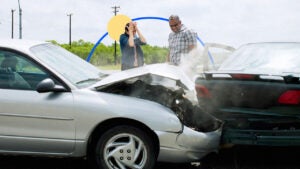What is a collision deductible waiver?




Key takeaways
- A collision deductible waiver (CDW) is an optional endorsement that covers your deductible if you’re hit by an uninsured driver and must use your collision coverage instead of their liability insurance to file a claim.
- CDWs may not cover certain types of situations, such as hit-and-runs, partial-fault accidents and accidents with underinsured drivers.
- This endorsement to a standard auto insurance policy is very limited and only offered in California and Massachusetts.
- Uninsured motorist property damage (UMPD) coverage is often available as an alternative if you want a low-deductible way to protect yourself from uninsured drivers.
No matter how safely you drive, there’s always a chance that an irresponsible or distracted driver makes you the victim of an accident. Once the damage is done, it’s a toss-up whether the at-fault driver has car insurance. If you’d rather not take that gamble, a collision deductible waiver (CDW) can help hedge your bets. This optional endorsement waives your deductible when you’re hit by an uninsured driver and have to rely on your own collision coverage for repairs. CDWs vary by state and insurance provider, but they can be a smart safeguard depending on your policy structure and financial risk tolerance.
What is a collision deductible waiver?
A collision deductible waiver (CDW) is an optional feature you can add to your car insurance policy. It is an endorsement that covers your collision deductible when you are involved in an accident with an uninsured driver. It is not available in every state or with every insurance company.
In a typical car accident, the not-at-fault driver can file a claim against the at-fault driver’s liability insurance, up to their coverage limits. However, if the at-fault driver doesn’t have insurance, you may be forced to use your own collision coverage — if you have it — to pay for repairs. That can feel unlucky and unfair, since the accident wasn’t your fault. But, in essence, a CDW removes the gamble of hoping the other driver has insurance.
How does a collision deductible waiver work?
How a collision deductible waiver works and when it applies depends on the guidelines set by your insurance company. That said, there are some common restrictions that most companies follow:
- Coverage requirement: In order to have a CDW, you must have collision coverage, which is usually part of a full coverage car insurance policy.
- Actual cash value (ACV): The ACV of your vehicle must be more than your deductible — though if your car isn’t worth much, you probably don’t carry collision coverage anyway. In general, it makes sense to drop collision coverage when the cost of premiums and deductibles exceeds what you’d likely get from a claim.
- Fault determination: Most insurers require you to not be at fault for the accident. Some auto companies may require you to be 100 percent fault-free to have the collision deductible waived, while others may waive a percent of your deductible based on your percentage of fault.
- Driver identification: The at-fault driver typically needs to be identified and found uninsured for your CDW to apply. In cases of hit-and-runs where the driver is never identified or cases where the driver is just underinsured, the CDW would generally not apply.
Collision deductible waiver in California
In California, collision deductible waivers follow the same acronym, but are technically called California deductible waivers under state law.
California Insurance Code requires insurance companies to offer policyholders a CDW if they have both collision coverage and uninsured motorist bodily injury (UMBI) coverage on their policy. California requires insurance companies to offer uninsured motorist property damage (UMPD) coverage to all policyholders who do not have collision coverage but allows policyholders to reject this coverage by signing a waiver.
California also does not allow policyholders to carry both collision and UMPD simultaneously, since the protections are somewhat redundant. Both can cover damage to your vehicle caused by an uninsured driver, but collision applies regardless of fault, while UMPD is specifically for cases where you’re not at fault and the other driver is uninsured. Allowing both would mean double coverage for the same incident, which insurance regulations aim to avoid.
For California drivers who opt for UMPD on top of liability-only coverage, the UMPD coverage limit is a fixed amount of $3,500 and is without a deductible.
Collision deductible waiver in Massachusetts
The state of Massachusetts doesn’t require CDWs to be offered like California, but it is unique in the fact that UMPD is not an alternative option. Most states have both or neither. So this means that having collision coverage with a CDW is your only option to avoid paying your deductible if your vehicle is damaged by an uninsured driver.
Alternatives to collision deductible waivers
Even a low deductible can be a significant out-of-pocket expense, especially if you have to pay it unexpectedly. If you don’t have the option of a CDW or choose not to have one, here are some alternatives that might help you save on deductible expenses:
Diminishing or vanishing deductible
Many insurance companies offer these options as either an additional endorsement you can pay extra for or as a policy benefit to preferred drivers. Once you select a deductible amount, the deductible is reduced over a certain period of time and as long as you stay incident-free. For example, if you select a $500 collision deductible, you may see a $100 decrease in your deductible every year you keep a clean driving record (no at-fault accidents or moving violations). The length of time and amount of reduction is determined by the carrier.
Uninsured motorist collision deductible waiver
An uninsured motorist collision deductible waiver is very similar to a CDW. If you are involved in a car accident with an uninsured identified driver and this driver is at fault for the accident, your insurance company will waive the collision deductible. Again, the specifics surrounding this coverage will depend on your insurance provider, but you usually have to pay extra for this waiver.
Uninsured motorist property damage
UMPD provides coverage for your vehicle and property when it is damaged by an uninsured driver. It essentially acts as a replacement for the property damage liability coverage the at-fault driver should have had. UMPD availability, coverage and deductible options vary between states and carriers.
Choose a low deductible
The most common collision deductible is between $500 and $1,000, but you may have lower options depending on your carrier. Some auto insurers offer a zero collision deductible, but they typically start at $100. While lowering your deductible will increase your premium, drivers with older cars might not see a significant change.
Is a collision deductible waiver the same as uninsured motorist coverage?
Collision deductible waiver and uninsured motorist coverage are not the same. The CDW, usually an optional add-on, waives your collision deductible in the event of a claim against an uninsured motorist. Uninsured motorist (UM) is a type of liability coverage that can pay for repairs and medical payments for you and your passengers caused by an uninsured driver.
UMBI usually only pays for medical expenses, and UMPD is a separate coverage for physical damage loss. However, some states have UM coverage that combines both coverage types, and some states don’t allow for UMPD coverage at all.
If a CDW isn’t available through your insurance company or in your state, uninsured motorist property damage can be a practical alternative. With uninsured driving on the rise, UMPD offers a more affordable way to stay protected — often with lower premiums and deductibles compared to collision coverage. See the table below for UMPD availability by state.
States with mandatory UMPD
| State | Minimum UMPD limit | Mandatory deductible |
|---|---|---|
| Maryland | $15,000 | $250 |
| North Carolina | $50,000 | N/A |
| South Carolina | $25,000 | $200 |
| Vermont | $10,000 | $150 |
| Virginia | $20,000 | $200 – hit-and-run |
| West Virginia | $25,000 | $300 |
| Washington, D.C. | $5,000 | $200 |
States with optional UMPD
| State | UMPD limit | Mandatory deductible |
|---|---|---|
| Alaska | Various options | $250 |
| Arkansas | Various options | $250 |
| California | $3,500 per accident limit | N/A |
| Delaware | Various options | $250 |
| Georgia | Various options | Optional |
| Indiana | Various options | $300 |
| Illinois | Various options | $250 |
| Louisiana | $10,000 only | $250 |
| Mississippi | Various options | $200 |
| New Jersey | Various options | $500 |
| New Mexico | Various options | $250 |
| Ohio | $7,500 | $250 |
| Rhode Island | Various options | $200 |
| Tennessee | Various options | $200 |
| Texas | Various options | $250 |
| Utah | $3,500 only | $250 |
| Washington | Various options | $300 hit-and-run$100 all other incidents |
| Wyoming | Various options | N/A |
Pros and cons of a collision deductible waiver
Deciding to add a collision deductible waiver to your policy or not is all about balancing cost with risk tolerance. Some providers offer CDWs for a flat fee while others charge on a scale, with higher deductibles costing more to waive. From there, it’s worth comparing the added cost to your actual risk. If you live in a state with a high number of uninsured drivers, a CDW may be a smart investment — especially if covering your deductible on short notice would be a financial strain.
A CDW is often an optional add-on you can toggle when customizing your car insurance quote, making it easy to weigh the cost against the potential benefit. If your state doesn’t offer CDWs, then UMPD may serve as an alternative form of protection against uninsured drivers. And if neither CDWs or UMPD are available, purchasing collision coverage with a low deductible may be your best fallback for avoiding steep out-of-pocket costs after an accident with an uninsured driver.
Frequently asked questions
Why we ask for feedback Your feedback helps us improve our content and services. It takes less than a minute to complete.
Your responses are anonymous and will only be used for improving our website.
You may also like

Does car insurance cover your parked car?

How do deductibles impact your car insurance?

What is full coverage car insurance?

What is a car insurance deductible?
